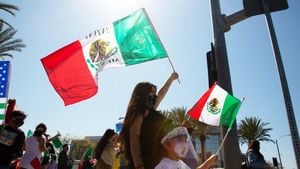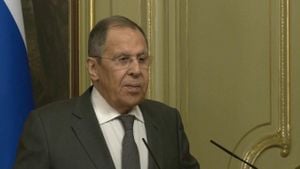South Korea's Defense Minister Lee Jong-sup has sparked controversy with recent remarks concerning the nation's military posture and defense strategy, particularly with respect to the looming threat from North Korea. These statements have led to significant backlash, emphasizing the delicate nature of military discussions within the country.
During his recent speech, Lee articulated the need for heightened military readiness, citing growing tensions on the Korean Peninsula. His remarks have raised eyebrows, especially among opposition political figures who see them as indicative of the government's potentially aggressive stance toward North Korea. Critics argue this approach could escalate tensions rather than promote diplomacy.
Political reactions have varied widely. Some lawmakers voiced support for Lee's assertions, asserting the importance of readiness to defend against external threats. On the other hand, opposition leaders have expressed fears over what they perceive as militaristic rhetoric. They assert it not only undermines aims for peaceful resolution but also burdens South Korean citizens with the potential for increased conscription.
Adding to the controversy, Lee’s statements were made against the backdrop of public discourse on military conscription, which remains a contentious topic within South Korea. The government has faced criticism not only for prolonging conscription periods but also for failing to adequately assess the socio-economic impact on young South Koreans.
Lee has stated, “We must maintain our resolve to defend our sovereignty and deal with security challenges head-on.” This assertion, relayed by major news outlets, reflects the administration's stance on enhancing military capabilities, yet it evokes concern among citizens about the potential for military entanglements.
Analysts note there is considerable public discontent with the notion of increased military engagement. They suggest Lee’s comments may not resonate well with younger generations who favor diplomacy over military solutions. The Minister's refusal to provide clarity on what increased military engagement entails has only intensified these concerns.
Political opponents have seized upon Lee's remarks to argue for a reassessment of South Korea's defense policies, advocating for greater emphasis on diplomatic engagement with North Korea rather than escalation. “Let us not forget the lessons of history; dialogue is necessary to build lasting peace,” one opposition leader was quoted as saying.
With regional tensions at their highest, citizens are watching closely how the South Korean government navigates its military policies. Public sentiment remains mixed; some support the need for strong defense, yet many remain wary of the repercussions of hostile engagements. The government's challenge lies not only in addressing international security but also reassuring its citizens of their safety and preferences for peace.
It remains to be seen how Lee's statements will influence South Korean defense strategies moving forward. Calls for accountability from his critics may force the defense ministry to embrace more diplomatic approaches, especially considering the complex relationship with North Korea.
Meanwhile, Lee has defended his position, reiterateing, “National security must always come first; we cannot afford complacency.” This categorical statement highlights the current government's priorities amid increased provocations from the North.
Looking forward, analysts believe Lee's comments may prompt broader discussions about military readiness not just within South Korea but also involving key allies like the United States. There’s increasing pressure for transparency and public discourse surrounding these military policies.
With tensions continuing to simmer on the Korean Peninsula, the broader Korean public will be observing closely how the government navigates these controversies. Heightened military readiness is one thing; engaging the populace around the need for defense versus diplomacy presents another challenge altogether.
The conversation surrounding Lee’s remarks is likely to evolve, affecting both political landscapes and societal attitudes toward defense policies. Moving forward, finding the right balance between military strategy and diplomatic efforts will be pivotal for South Korea’s future security measures.
For now, the discourse will likely continue to reflect the nation’s deep-seated anxieties about security and the fragility of peace on the Korean Peninsula.



